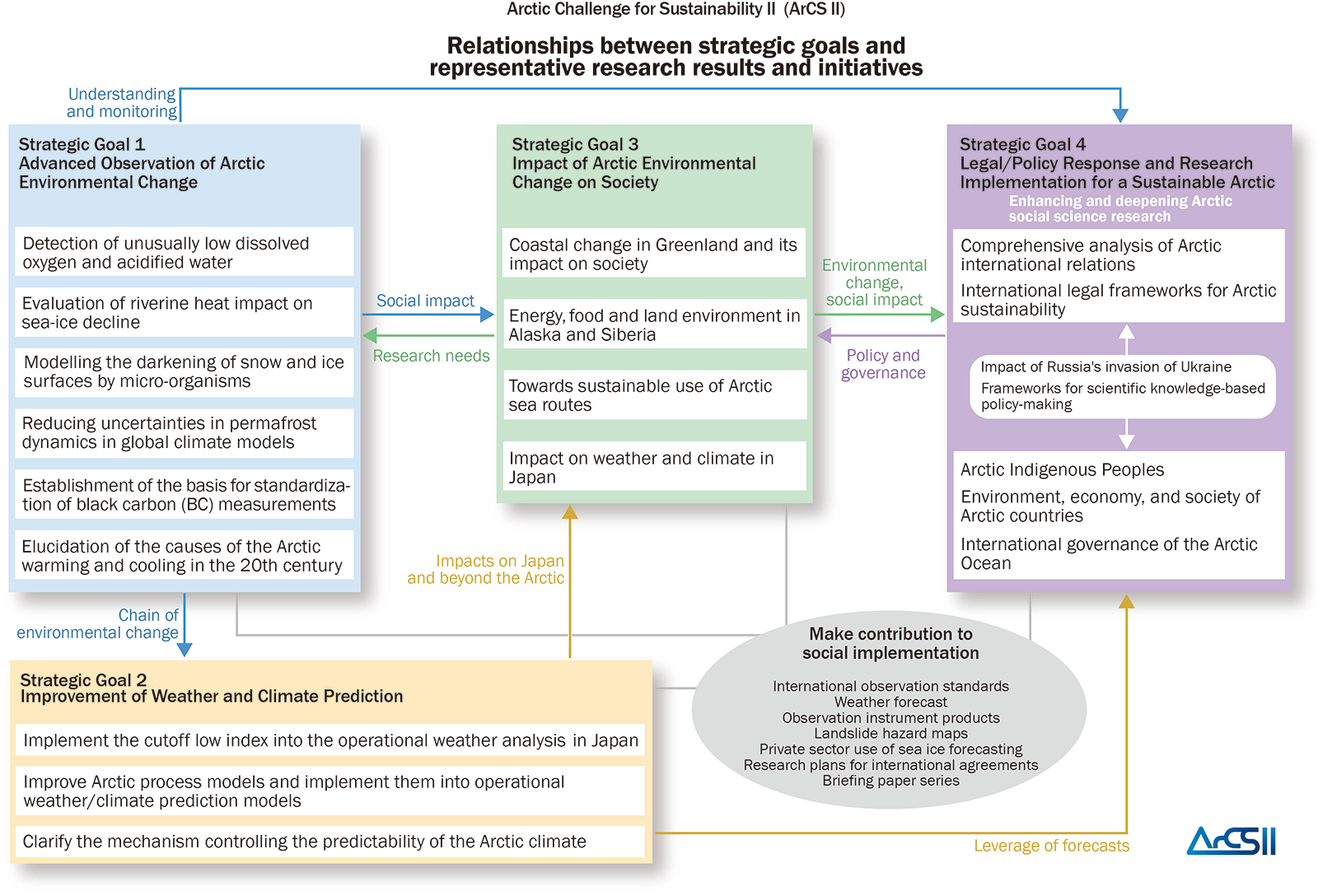Achievement
A New Look at Arctic Studies: Research in a Changing and Complex Environment and Society
The Arctic Challenge for Sustainability II (ArCS II) is characterized by the breadth of its target area, the diversity of its elements, and the fact that while each element is expected to produce outstanding results, they continue to seek a new form of Arctic research that is more organically combined through their collaboration. The individual Research Programs were expected to produce effective results in Arctic research through state-of-the-art observational techniques and effective approaches, and to develop the research results further to achieve the Strategic Goals and the Project Goal.
Since the project’s launch in June 2020, more than 50 domestic institutes have participated, and more than 360 researchers from Japan and abroad have been involved in the project to promote research activities. In addition, from the perspective of returning research results to society, efforts were also made to conduct trial social implementation. During the project period, research activities and social conditions related to the Arctic were greatly affected by the spread of COVID-19 and Russia's invasion of Ukraine, but we proceeded with the plans, taking measures such as changing the research sites and getting support from local collaborators, while also analyzing the effects themselves as new issues.

The figure above summarizes representative research results and efforts in each Strategic Goal of this project and the correlation among the Strategic Goals. The actual situation of Arctic environmental change was grasped and monitored, the chain of change was explored, and the necessity of observation and new issues were found through field activities. Impacts on Japan and beyond the Arctic were also investigated through teleconnection. The study of pan-Arctic and future climate has been generating new knowledge in this field and is being used as basic information for future projections not only for the Arctic but also for the entire globe. The reality of environmental change and social impacts have contributed to policy and governance discussions on Arctic sustainability.
The role of ArCS II as Japan's Arctic research project was to advance scientific activities that respond to the ever-changing and increasingly complex environment and society. In contrast to the actual situation and predictions presented by natural science based on accumulated knowledge and technology, unpredictable conditions often occur in the environment and society. The Arctic is a place to analyze and consider possible solutions to these issues. This was not limited to specific regions or phenomena in the Arctic, but was also a practical activity to explore more general issues and solutions. In addition, there will continue to be a need to strengthen cross-disciplinary collaboration that is not limited to the natural sciences but also includes social sciences, engineering, law and policy, and to bridge the gap between scientific study and practical application and practitioners. We hope that a common awareness of the ideal Arctic and the challenge for stronger and more sustainable research will continue across the generations, transcending the differences between the traditional domains of science and society, countries and regions, the latest scientific technologies or approaches, and traditional wisdom or ways of thinking about life and culture.
Achievements for each Strategic Goal
- Strategic Goal 1 Advanced Observation of Arctic Environmental Change
- Strategic Goal 2 Improvement of Weather and Climate Prediction
- Strategic Goal 3 Impact of Arctic Environmental Change on Society
- Strategic Goal 4 Legal/Policy Response and Research Implementation for a Sustainable Arctic
Achievements of each Research Program
- Atmosphere Atmospheric Environment and Climate Forcings in the Arctic
- Ocean Research and Public Dataset Production on the Arctic Marine Environment
- Cryosphere A Changing Cryosphere in a Rapidly Warming Arctic: Properties and Processes
- Land Biogeochemical Cycling in the Arctic Terrestrial Ecosystem, Permafrost and Periglacial Regions
- Teleconnection Teleconnections and the Predictability of Weather and Climate
- Climate Prediction Weather and Climate Prediction and Its Technological Improvement
- Human Society Human Security, Energy and Food in the Arctic under Climate Change
- Arctic Sea Routes Sustainable Arctic Sea Routes in a Rapidly Changing Environment
- Coastal Environments Arctic Coastal Change and Its Impact on Society
- International Law Designing Resilient International Legal Regimes for a Sustainable Arctic and the Contribution of Japan
- International Relations Elucidating the Complex Dynamics of Arctic Politics and Its Contribution to Japan’s Arctic Policy
Achievements of each Priority Subject
- Priority Subject 1 Capacity Building and Research Promotion
- Priority Subject 2 Strategic Dissemination of Arctic Information
Initiatives for Research Infrastructures
- International Collaboration Sites
- Research Vessel
- Earth Observation Satellite Data
- Arctic Data archive System (ADS)
List of the Research Achievements
Please click here to view the list.
